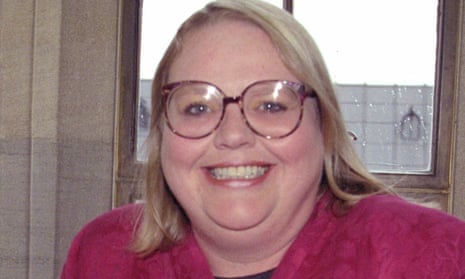Candy Atherton, the former Labour MP who has died suddenly aged 62, was an indomitable campaigner who spent her life fighting inequality and injustice. When she won the marginal seat of Falmouth and Camborne in 1997, famously defeating the Conservative incumbent, Sebastian Coe, she became the first Labour MP in Cornwall since 1970 and the first woman MP in the county since 1920.
During her eight years in the House of Commons she helped persuade the Labour government to pursue “Objective One” status for Cornwall, thus channelling European funds to the county to help improve the NHS and transport infrastructure, to introduce superfast broadband and to develop university facilities. This led to new road-building, an airport at Newquay, the opening of a minor injuries unit at Camborne and Redruth hospital, the expansion of Falmouth College of Art as a university, and the opening of a campus of the University of Exeter at Penryn.
Prior to the election there had been some local controversy over her selection, as the first prospective candidate in the country to be chosen from an all-female shortlist under a Labour party policy that was later declared illegal. Two local councillors resigned from the party in protest, one of whom subsequently stood against her as an Independent Labour candidate, somewhat denting her majority of 2,688.
Atherton had an unassailable belief in the potential for achieving change and improvement, and was tireless in pursuit of her ambitions for those she represented. Her energy and enthusiasm were the more remarkable as she had a debilitating autoimmune disease that, in later years, restricted her mobility. Her illness never affected her unfailing good humour, her personal optimism or her ability to inspire those around her with a similar confidence.
Candy was born in Surrey, daughter of Denis Atherton, a journalist on the Daily Mirror, and his wife, Pamela (nee Osborne), a businesswoman. She was educated at the Convent of the Sacred Heart (now Woldingham school) in Woldingham, Surrey, and Midhurst grammar school in West Sussex. She joined the Portsmouth News on leaving school, but after a year joined the West Sussex probation service in 1975 to work with young offenders, and also helped found a women’s refuge in the area. Her parents separated at this time and she worked with her father as a journalist.
As a young woman she saw journalism as the means to pursue her crusades, and she swiftly moved to link her instinctive communication skills with the possibilities of what she could achieve through politics. In 1979 she joined the Labour party, albeit in the politically unpromising, cushioned comforts of Conservative Petersfield, in Hampshire. She was then very much on the left of her party and aspired to work for Tony Benn, but instead briefly worked at the Commons for two leftwing female MPs, Judith Hart and Jo Richardson. She was already committed to fighting for women’s rights and in 1984 was part of a collective that founded a short-lived magazine, Everywoman, designed to counter the myth of the “superwoman” and to improve all women’s lives. The following year she graduated from the Polytechnic of North London (now London Metropolitan University) with a BA in applied social sciences.
In 1986 she was elected a member of Islington council in north London, where she chaired the women’s and disability committees, and of the Association of London Authorities. She was mayor of Islington in 1989-90 and a councillor until the 1992 general election, when she stood unsuccessfully as the Labour candidate in Chesham and Amersham, Buckinghamshire. She then moved to Westbury in Wiltshire and sought election to Wiltshire county council in 1993, again without success.
Atherton set up home in Cornwall on election in 1997, and when in London lived on a narrowboat on the Grand Union canal called the Honourable Lady.
In her maiden speech to the Commons, Atherton drew attention to Cornwall’s unenviable status as an area of unemployment and the lowest pay in the country. She pledged to bring in new work and jobs and to fight for the introduction of the national minimum wage, which was enacted by the Tony Blair government.
She campaigned for those seeking to redevelop Cornwall’s last tin mine at South Crofty, near Camborne, and on behalf of people affected by the production of deadly nerve gas at the Ministry of Defence base at Nancekuke.
A loyal supporter of Blair, she nevertheless did not progress beyond the backbenches. She was a member of the education and employment select committee from 1997 to 2001 and of the environment, food and rural affairs committee thereafter. She lost some support in her constituency for voting in favour of the ban on hunting and for backing the Iraq war, and she was sometimes criticised for having demonstrated an unswerving loyalty to the government line.
In the 2001 election she nearly doubled her majority, but lost in 2005 when the Liberal Democrats took all five parliamentary seats in Cornwall.
She remained in the county and was active in local affairs. She also joined the board of the Housing Corporation, chairing its rural housing advisory panel, and founded her own public relations company. Her other enthusiasms included birdwatching, inland waterways and protecting marine life on the seabed.
In 2002 she had married a Cornishman, Broderick Ross, a former shipwright and photographer whom she had met when she was selected as the candidate and who worked with her on her campaigns. In 2009 she stood for election to the new Cornwall council, along with Broderick, his mother, Betty Ross, and her mother, Pamela. They were all defeated, but Atherton was elected in 2013 and re-elected this year. She was also a member of Falmouth town council.
She was attending a local government conference in Milton Keynes when she died unexpectedly during the night.
Candy is survived by Broderick and Pamela. Denis died in 1998.

Comments (…)
Sign in or create your Guardian account to join the discussion